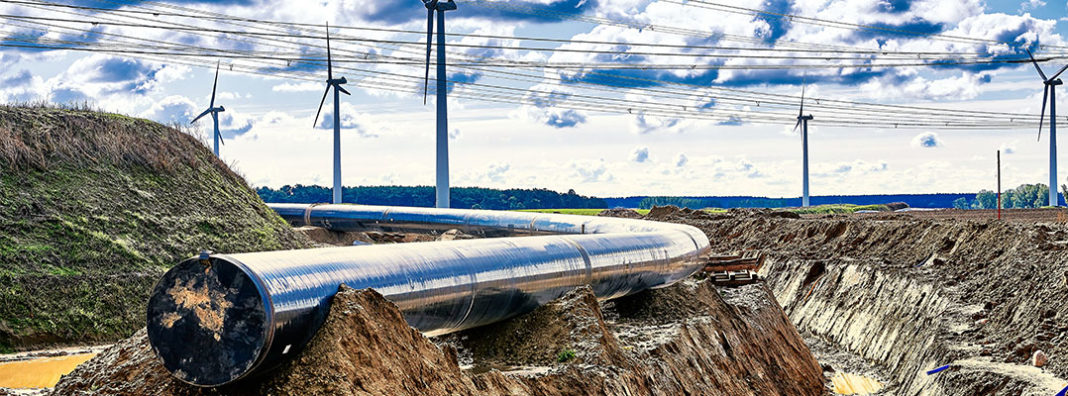
Among the many causes of Russia’s invasion of Ukraine, one that stands out is Europe’s dependence on Russian natural gas. For too long, the West complacently stood by as Putin turned Russia into a rentier state. It is now, predictably, becoming an aggressive and brutal dictatorship. To counter Putin’s ambitions, both in the short term and the long term, the West must embrace a strategy of energy abundance.
Energy scarcity and dependence enabled the war in Ukraine
The United States achieved primary energy independence, defined as greater primary energy production than consumption, in 2019. The US isn’t fully independent within all classes of energy goods, particularly crude oil, and it continues to buy a relatively small amount of crude from Russia. But overall, America produces about the same amount of energy that it consumes, and in fact a little more.
Europe, on the other hand, is extremely dependent on energy imports. Before the pandemic, the 27 countries of the EU had energy imports dependency of over 60%. Of all EU members, only Norway is a net energy exporter.
About 23% of EU energy imports come from Russia. This dependency on Russian energy—especially natural gas—combined with some European countries’ tendency toward mercantilism, has hampered the continent’s ability to address Vladimir Putin’s past offenses, or even to see them in a clear-eyed way. If Russia is a critical trading partner, why antagonize it by looking too closely at Putin’s sins, especially when they are presented as a fait accompli?
Putin has helped to foster European dependency on Russia, including by supporting environmental groups opposed to alternative sources of energy in Europe. In 2014, NATO Secretary-General Anders Fogh Rasmussen reported that he had met with “allies who can report that Russia, as part of their sophisticated information and disinformation operations, engage actively with so-called non-government organizations—environmental organizations working against shale gas—obviously to maintain European dependence on imported Russian gas.”
European countries have banned fracking or regulated it so strictly that it is effectively banned. Devin Nunes, the former chairman of the House Intelligence Committee, claimed in 2018 that Russia was financing the anti-nuclear movement in Germany, which recently shut down three of its final six nuclear power plants.
As a result of Europe’s energy poverty and dependence (as well as experiencing minimal consequences from seizing parts of Georgia in 2008 and Crimea in 2014), Putin must have assessed that the blowback from Europe of Russia toppling the Ukrainian regime would be minimal. And indeed, initially, it was. It took days to get Germany, Italy, and Hungary to agree to financial sanctions. Ever the mercantilist, Italian Prime Minister Mario Draghi wanted, and received, a carveout for Italian luxury goods. It was only when the Ukrainians succeeded in repelling the initial Russian forays that Europeans got behind more forceful sanctions that Putin clearly did not expect.
Even if Putin’s assessment of Europe’s willingness to act was an error in judgment, it was an error that would not have been made had Europe not been dependent on Russia for energy supplies in the first place. He would have observed that Europe had clear strategic autonomy and would not have relied on a feckless Western response in his invasion calculus.
No one knows for sure if this would have avoided the war, but it may have.
Rentier states behave badly
Moreover, there is a deeper way in which energy scarcity enabled the Ukraine invasion. Oil and gas, for Russia, represents a natural resource rent that makes its ruler less sensitive to domestic public opinion than dictators that don’t have such resource rents.
As I have put it elsewhere, “monopolization of domestic resources for sale on the foreign market can result in a resource curse. Rentier states are often indifferent or hostile to the demands of the population because they do not rely on them for tax revenue. If anything, they view the public as a political threat that could unseat them. The rent from the monopolized resource enables the state to finance political repression.”
That certainly rings true for Putin’s rule of Russia. If energy in the rest of the world were more abundant and its price lower, the value of Russia’s resource rent would be smaller and Russia might have been able to develop into a more normal democracy. Not only, then, does energy abundance enable strategic autonomy, it reduces the need for strategic action against dictators because it reduces dictators’ stranglehold on their populations.
What do we do now to increase energy abundance?
To address the crisis in Ukraine, we need both immediate and long-term increases in energy supply.
Mitigating the short-term energy crisis
We need immediate increases because gas flows from Russia could be cut off at any moment. This could happen because Europe chooses to disconnect itself—Russia has decreed that 80% of every Euro Russian companies receive in export revenues must be sold for rubles to prop up the nation’s currency, slightly blunting the effect of sanctions. Russia receives about $250 billion per year in fossil fuel revenues, and by carving out energy from sanctions, Europe is essentially funding Putin’s war.
But even if Europe doesn’t shut off gas receipts itself, a supply shock could still be imminent. Geopolitical strategist Peter Zeihan argues that energy disruption is virtually inevitable. For example, stray missiles could hit a Ukrainian pipeline, pump, or depot. Because of self-sanctioning, we have a global oil shortage of 2 million barrels per day already, equal to around 10% of American oil consumption.
Even if the gas keeps flowing to Europe, it is urgent to take actions to lower the global price of oil so that Russian revenues go down. As Austin Vernon notes, small changes in supply and demand have a huge effect on the price of oil and gas. Therefore, the sooner we increase the supply of non-Russian energy, the better.
We must come to terms with the fact that for immediate increases in energy supply to Europe, much will have to come from fossil fuels. While we all want to transition to a zero-carbon system of abundant energy, there is no way to make that transition happen immediately.
To support our strategic autonomy in the current crisis, we need new sources of oil and gas. Through sanctions, this increase in non-Russian production can be matched by decreases in Russian production, leaving carbon emissions much as they were. Even better, American natural gas is nearly twice as clean as Russian gas, from a methane emissions perspective. Swapping in American liquified natural gas (LNG) for Russian gas would be good for the climate. Over the medium and long term, we can focus on substituting clean energy for fossil fuels.
We must, therefore, take advantage of American fracking, as Karl Smith has argued. The Biden administration has been waging war against new oil and gas leases on federal lands. Whether or not that is good policy in normal times, in an energy emergency, when we are scrambling to insulate ourselves and our allies from energy shocks, it makes no sense.
Even worse than these leasing obstacles, drillers say that the adminstration’s hostility to oil and gas has made financing new wells challenging. The administration should make it clear that substituting American oil and gas for Russian fossil fuels is a national strategic objective to allay investors’ concerns. A more positive disposition could also help with financing for already-permitted LNG terminals, which we could use to supply more gas to Europe.
In addition, a suddenly more proactive Europe should embrace sensibly regulated fracking to bolster its independence from Russia. Europe has its own oil and gas reserves that could be reached through fracking, but because it doesn’t have any existing oil services infrastructure, it would take several months to get production moving.
With a few months of reserves now, milder weather on the way, additional supplies from the US, and a ramped up European oil and gas industry, Europe could ride out a Russian supply shock, but it needs to start planning for that scenario now. In addition, Europe should try to hasten the construction of LNG terminals, which would allow it to receive more gas from non-Russian sources. LNG terminals take years to build, but some are already in development. All efforts should be taken to accelerate their entry into service.
Finally, Germany should restore to service the three nuclear power plants that it shut down only two months ago. Nuclear power is an excellent substitute for European gas demand, but it takes years to build new plants. By re-opening perfectly good nuclear plants, Germany can take a bite out of Europe’s fossil fuel demand.
Addressing the long-term energy rent problem
We also need increases in energy over the long run because this conflict may last a long time. US and UK officials are estimating 10 years or more. Furthermore, Russia’s ability to produce energy will atrophy under sanctions and divestment. Without access to Western financing, expertise, technology, or even spare parts, Russia’s output will decline over time. Western firms are exiting partnerships with Russian companies in technically challenging energy projects—for example, ExxonMobile is discontinuing operations at Sakhalin-1. This divorce will reduce Russian output over time, regardless of whether sanctions remain in place.
In the medium and long run, we need to invest in non-fossil energy, not only because it would emit less carbon dioxide and enable greater energy abundance, but also because it would drain the coffers of rentier states around the world, including Russia. Wind and solar energy have become incredibly cheap, but they don’t work in all locations. Solar, in particular, does not offer much of a solution for Europe, because Europe is at counterintuitively high latitude. Berlin, for example, is further north than Saskatoon, Saskatchewan.
In order to produce the firm and dense power we need to really have strategic autonomy from rentier states, we must develop new geothermal and nuclear technologies. For advanced geothermal, which is technologically similar to oil and gas drilling, the existence of an oil services industry in the United States gives it a leg up over many other parts of the world. If Europe is willing in the short term to legalize fracking, the oil services industry that develops will be able to pivot to geothermal over the medium term as I expect to happen in the US. The biggest obstacle to geothermal development in the US is our insane permitting system under the National Environmental Policy Act.
All over the world, we need more nuclear power plants. In the United States, there is not a single operating reactor that began its permitting and licensing process since the Nuclear Regulatory Commission was established in 1975. We need wholesale NRC reform, potentially including ending the independent agency as we know it and moving its functions under the Department of Energy.
The United States needs to take a lesson from France, which generates 70% of its electricity from nuclear reactors. Unlike the US, France’s 56 operating nuclear reactors consist of only a small number of models. By churning out reactors in cookie-cutter fashion, France drives the cost of nuclear power down. In the US, we have more site-specific requirements (such as NEPA review) that make the cookie cutter approach challenging. It’s possible that new technologies such as microreactors and small modular reactors could bring economies of scale to American nuclear power, but that will require regulators to approve these new designs and projects.
We must become less complacent. The invasion of Ukraine, and the brutal slaughter of large numbers of innocent civilians that now seems likely, is Vladimir Putin’s fault. But Putin was enabled every step of the way by Western complacency about energy supplies.
If we want to avoid future such crises, we should develop such a rich abundance of energy supplies that dictators reliant on resource rents will cease to exist, or in any case, won’t be inclined to miscalculate Western strategic autonomy.

